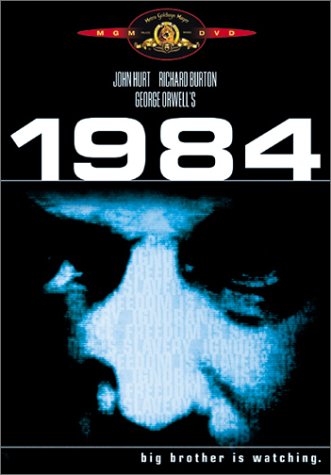
NINETEEN EIGHTY FOUR
UK, 1984, 113 minutes, Colour.
Richard Burton, John Hurt, Susanna Hamilton, Cyril Cusack.
Directed by Michael Radford.
1984 was filmed in and around London, April to June 1984, the exact time setting of George Orwell's 1948 novel. There had been a celebrated television version of the novel in the '50s as well as a film, directed by Michael Anderson, starring Americans Edmond O'Brien and Jan Sterling as well as Michael Redgrave.
This film, to celebrate the novel, was written and directed by Michael Radford (Another Time, Another Place). It presents Orwell's vision grimly, in expertly designed squalid London settings, with fine performances by John Hurt and, Richard Burton (his last film), and with an orchestrated, score which includes anthems, chants and songs. The film is grim, hard going - relentless. Fortunately, Orwell's vision has not been fulfilled. However, what he presented in symbol as a totalitarian state where the individual was nothing, of course, has been accomplished more subtly in many societies. The film is a thought-provoking interpretation of Orwell.
1. The status of Orwell's novel, the various versions of the novel? a tribute to 1984 (made in the same place and time of the novel)?
2. London, grim, low and squalid living standards, the flats and corridors, refectories, the shops, the area of the Proles, Victory Square, prison, offices, torture rooms? Squalid decor, costumes? The contrast with the country scenes and imagination? The ambience of Orwell's vision?
3. The range of the score, moods, anthems, chants and songs?
4. The relationship to the novel, the visualising of the vision and the message?
5. The world of the '50s and '80s as imagined by Orwell: the three zones of Oceania, Eurasia, East Asia? The wars and their changing hostilities, the various fronts, the enormous number of casualties and prisoners? The squalor and decay of the city, the ugly and decrepit houses, trains, streets, garbage piles? The workers in their anonymous overalls? calling each other 'brother'? The importance of industry? Departments of information, pornography? The rallies, the brain-washing and the loss of memories? The meagre food, the chocolate rations? 'No hope for the future'?
6. Authorities in this world: the famous Big Brother? Watching everybody, the television screens which people watched and were watched by? The need to love Big Brother? Television as a constant, invasion of privacy? The loudspeakers and the incessant information? Moods, news? Newspeak and the elimination of language, dictionaries getting smaller? Orgasm and Artsem and the elimination of the family? The elimination of information and news? Goldstein held up as the enemy? His alien philosophy? Television confessions?
7. The focus on O'Brien, his place in Winston Smith's past, watching Winston, part of the authorities? His own office, servant, wine, able to turn off the television? Goldstein's book - and his comment later about writing it? His ability to brainwashing, torture? His fingers and 2 plus 2, elimination of memories? his attitudes towards truth, loving, Big Brother? Assuming complete control? Room 101 and his explanation of torture? Richard Burton's presence, age, voice and delivery, a human face to O'Brien?
8. John Hurt as Winston Smith: everyman? Appearance, emaciated and suffering? His work and his changing information,- the phone calls, the burning of the newspapers, crossing out headlines, the monitor screens with individuals who could be substituted. for patriotic purposes? The rallies? Seeing Julia and fascinated by her, her falling and the messages? At home and his writing in his diary? The single razor blade and the search for razor blades? The ugly room, the television screen, waking up, the morning exercises and touching toes, the rebuke from the screen? No lifts? Their not working? Parsons and his cheerfulness, using, Newspeak, praising the food with no meat, taking Smith's? The visit to the shop, buying the bauble? Meeting Julia, going on the train, his stories to justify himself, the singing children on the train? The beauty of the woods and the bills? The sexual encounter, its intensity? Memories, Oranges and Lemons ... ? Watching the fat lady singing at the clothesline? The room, the nakedness of the couple, their passion, talking, sharing, coffee? Julia stating that she was corrupt - or telling the truth? Winston's memories, as a child, stealing, his mother, her death? The rats eating her? O'Brien's presence? His memory of visiting the Proles,- and the remembered sequence of the visit to the prostitute, the squalor, attracted by her painted face? His work, the changing war, the new enemy? Visiting O'Brien, the wine, the dictionary, reading Goldstein's book? The suddenness of their being caught, the humiliation, the torture, the interrogation? O'Brien and the torture machine, fear, twisting of truth, 2 plus 2 and O'Brien's fingers, denying the truth, wanting to tell the truth - but still seeing four fingers? His unconscious going off to the fields, seeing Julia saying she loved him? Room 101, the rats, denouncing Julia? His return to the cafe, playing chess, Julia's visit and the impersonal telling her that he had denounced her, she him? His being drugged? The good news about the war fronts? Completely conquered? The camera finally distancing itself from his solitary figure?
9. Socialism with brotherhood, the state, anti-individual, control of truth, memory, room 101 and its most serious torment and torture for the individual?
10. Parsons and what he represented, cheerful in the’ squalor, cheerful talk, chocolate ration, eating the food, explaining it, his little girl, in prison and the irony that she denounced him and he was proud of her?
11. The shop-owner, his wares, selling, showing Winston the room, the picture and the irony of the television and his being part of the thought police?
12. The presentation of the masses, the rallies, their shouted support, gesture, marches, response to speeches, the denunciation of Goldstein, the confessions? Winston's confession?
3. The pessimism of the story, vision of society, its drives: power, war, economic precariousness, mass thinking? human nature - resilient or not?